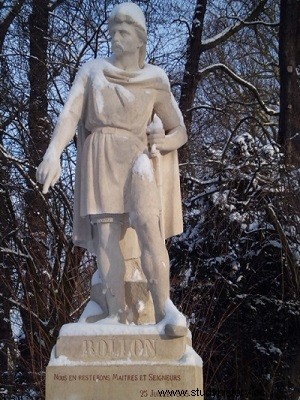
ROLL (Rollo)
(Died c. 930.) Norman leader, first duke and prince of Normandy (911-927). His life is not well known because we should probably only give credit relative to the abundant details given about him by a canon of Saint-Quentin, Dudon, in his History of the Dukes of Normandy. Of Danish origin and of great birth according to the latter, Rollo was first the host, in England, of the Danish king Athelstan. Then he went to the continent, took part in the siege of Paris in 885, led in 890, at the head of the Normans of Basse-Seine, an expedition against the Count of Bayeux, whose daughter he married "in the Danish manner", c i.e. without too many formalities, plundered Lisieux in 891 and finally settled in Rouen after having conquered a large part of the country which was to take the name of Normandy. But a Norwegian saga sees in him a Norwegian Rolf, expelled from his country for piracy, a refugee and married in the Hebrides, and of whom we do not know much else. Norwegian or Danish, he tries like his predecessors to seize Paris (910). In vain. After this failure, Charles le Simple inflicts another near Chartres (July 911). Rollo, whose troops were beginning to run out of steam and were trying to stabilize themselves, was then ripe for a lasting accommodation with Charles the Simple who, by negotiating, hoped to put a definitive end to the Norman brigandage raids. Prepared by the Archbishop of Rouen Witon and the Count of Paris Robert, an agreement was concluded in the fall of 911 at Saint-Clair-sur-Epte, on the border of the lands occupied by the Scandinavians.
This treaty grants "to the Normans of the Seine, Rollo and his companions" the dioceses of Rouen, Évreux and Lisieux, subject to the recognition of their vassalage to the King of France. Rollo had promised fidelity and peaceful possession of the conceded country to the king. He keeps his word, finding it directly in his interest, and remains a stranger to the coalitions and revolts of the Duke of France Robert and Raoul of Burgundy against Charles the Simple. But when he fell into the power of Raoul, Rollo recognized the new king and was rewarded (923) by granting the region of Vernon, between Seine and Eure, as well as the dioceses of Bayeux, Le Mans and implicitly, from that of Sées. On the lands of his authority, he endeavors to make reign an order and a peace that have become famous. We know the famous anecdote of the bracelets left by him on a branch and found in the same place many months later. We also know his law prohibiting the return of arable implements after work, so great was the security on his land. For the Viking chief's activity as a vigilante, tradition links it to the Norman custom of the "clamor de haro", an appeal to supreme authority, interpreting haro as Ah! Roll!
But we must be careful not to idealize the character too much. The former pirate was only doing, by encouraging his companions to continue their looting and their violence, to ensure their authority over them by helping themselves from the subjugated populations. He himself did not angel, and the baptism he received in 912 hardly made him a Christian. If the chronicler Adhémar de Chaannes is to be believed, “death threatening him, he went mad had one hundred Christian prisoners beheaded in his presence in honor of the idols he was worshipping, then distributed one hundred pounds of gold to Christian churches. in honor of the true had, in whose name he had received baptism.
